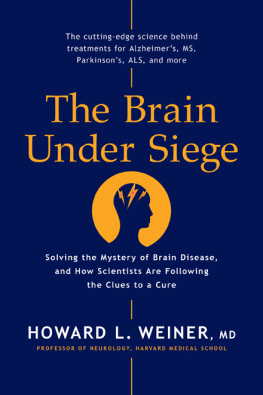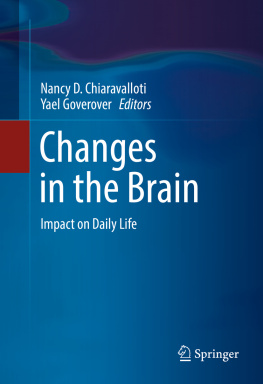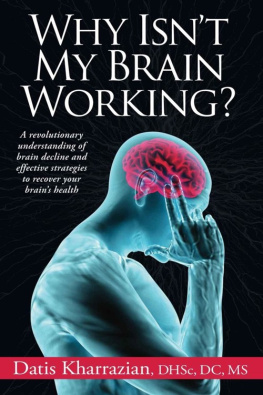Contents
Guide
Praise for The Brain Under Siege
If youre dealing with the diagnosiseither for yourself or a loved oneof a neurologic condition, youre likely feeling lost and overwhelmed. Look no further than this book, which not only breaks down whats happening in the brain like a crime scene, but inspires hope for future treatments. Its hard to get more complex than the human brain. In The Brain Under Siege, Howard L. Weiner has created a remarkable guide to neurologic diseases that we all can understand.
Ann Romney
Howard Weiner has an amazing ability to synthesize complex medical and scientific concepts into something accessible and understandable. He has been on the front lines of brain disease research for over 40 years. In The Brain Under Siege he tells the story of five of the most devastating neurological diseases. He likens each disease to a crime scene and explains how the crime will ultimately be solved. Not only is this book highly informative, its also genuinely fun to read.
Stephen L. Hauser, MD, Robert A. Fishman Distinguished
Professor of Neurology at the University of California, San Francisco,
and director of the UCSF Weill Institute for Neurosciences
Howard Weiners latest book, The Brain Under Siege, breaks down the complexities of brain health and disease in an accessible and enjoyable way. He opens up the world of drug development and how scientific discovery moves from the laboratory to clinical trials and ultimately to FDA approval.
Al Sandrock, MD, PhD, head of research and development at Biogen
A fascinating read, The Brain Under Siege is educational, memorable, and perhaps most important, optimistic. Chances are you know someone affected by one of the common illnesses of the brain. The Brain Under Siege explains the science behind these diseases and the possible pathways to a cure. Dr. Howard L. Weiner has done an inspiring job of putting it all together. This is a valuable resource for both the medical community and the lay public.
Merit Cudkowicz, MD, Julieanne Dorn Professor of Neurology
at Harvard Medical School, chief of neurology and director at
Healey ALS Center, Massachusetts General Hospital
The stakes are high when the brain is in trouble. Howard L. Weiner chronicles the heroic efforts that have led to astounding progress in our ability to understand and treat the most essential and most fragile part of our humanity. For each brain disease explored, the analogy of a crime scene draws the reader into the detective work that goes on as researchers painstakingly track down suspected causes. The Brain Under Siege reveals the drama behind the science as doctors grapple with the most complicated structure in the universe.
Daniel Z. Lieberman, MD, coauthor of The Molecule of More
When it comes to complex medical issues, patients and their families are usually overwhelmed. The situation is complex even for scientists in the field. In Howard Weiners ambitious new book, The Brain Under Siege, this talented neurologist tackles brain disease and unravels its complexityno easy feat for such a heavy subject. Likening the diseased brain to a crime scene, he takes the reader on the challenging journeys to find the elusive cures for these brain diseases. The book is a must read for anyone who wants to learn more about the scientific process and the urgent quest to treatand then preventchronic brain diseases.
Dennis J. Selkoe, MD, Vincent and Stella Coates Professor of Neurology
at Harvard Medical School and codirector of the Ann Romney Center
for Neurologic Diseases at Brigham and Womens Hospital
ALSO BY HOWARD L. WEINER, MD
Nonfiction
Neurology for the House Officer
Curing MS
Fiction
The Childrens Ward
Film
What is Life? The Movie
Abe and Phils Last Poker Game

This book is for informational purposes only. It is not intended to serve as a substitute for professional medical advice. The author and publisher specifically disclaim any and all liability arising directly or indirectly from the use of any information contained in this book. A health care professional should be consulted regarding your specific medical situation. Any product mentioned in this book does not imply endorsement of that product by the author or publisher.
The Brain Under Siege copyright 2021 by Dr. Howard Lee Weiner
All rights reserved. No part of this book may be used or reproduced in any manner whatsoever without written permission of the publisher, except in the case of brief quotations embodied in critical articles or reviews.

BenBella Books, Inc.
10440 N. Central Expressway
Suite 800
Dallas, TX 75231
benbellabooks.com
Send feedback to
BenBella is a federally registered trademark.
First E-Book Edition: October 2021
Library of Congress Control Number: 2021012421
ISBN 9781953295545 (hardback)
ISBN 9781953295880 (ebook)
Editing by Sheila Curry Oates
Copyediting by Judy Myers
Proofreading by Greg Teague and Cape Cod Compositors, Inc.
Indexing by WordCo Indexing Services, Inc.
Text design and composition by PerfecType, Nashville, TN
Cover design by Devin Watson
Special discounts for bulk sales are available.
Please contact .
To Dennis Selkoefor sharing the journey
and
To Ann Romneyfor her courage and inspiration
CONTENTS
I n 1997, I was in the middle of a lab meeting when I received an urgent call from Dr. Gordon Williams, head of endocrinology at the Brigham and Womens Hospital. Gordon and I had worked together on a number of scientific projects over the years. Gordons call was about a woman, a friend of his, who had just been diagnosed with multiple sclerosis. She was in distress, and he asked whether I could see her immediately. I agreed and soon found myself sitting across from a handsome couple, who were holding hands as the woman told me her story. She was forty-eight years old, and her symptoms began with numbness, fatigue, and lack of coordination. She felt that she was losing her ability to live her life, losing the ability to be the person, the mother, the wife that she had always been. When she was diagnosed, she was told there was little that could be done and to come back when her symptoms got worse. So she came to see me for a second opinion.
Whenever I see a patient who comes in with a diagnosis of MS, my first task is to make sure that the diagnosis is indeed correct. More than once, I have immediately cured MS when I discovered there had been an incorrect diagnosis. In this case, however, the diagnosis was unequivocal: the exam, the history, and an MRI showed abnormalities in the brain and spinal cord that all fit with MS. I was surprised that no treatment had been suggested and told the patient that there were in fact things we could do, and not to give up hope. I knew that more than anything, she needed hope.
I explained to her and her husband that we needed to treat her immediately, took her by the hand, and led her to the Infusion Center, where we began to give her large doses of corticosteroids to dampen the inflammation in her brain. She was seated next to people in wheelchairs, some getting chemotherapy, but much of the fear and uncertainty that she had shown when I began my exam had dissipated, because something was being done. I never reveal the identity of a patient, except in this case the patient has already told her story publicly. The patient was Ann Romney, and she has become a crucial advocate in the search for treatments and cures for debilitating neurological diseases. She and her husband, Mitt, have led the charge in raising philanthropic funds for the Ann Romney Center for Neurologic Diseases at Brigham and Womens Hospital, where Dennis Selkoe and I have devoted our lives to cross-pollinating research across MS and Alzheimers. With the formation of the Ann Romney Center, we raised our efforts to a higher level and added amyotrophic lateral sclerosis (ALS), Parkinsons disease, and brain tumors to our research goals.
Next page










